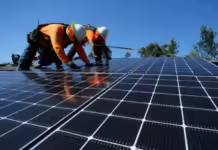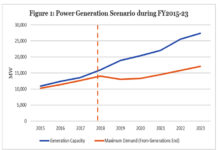Originally posted in The Business Standard on 28 February 2022

European investments in Bangladesh are set to get a boost in the coming years, specifically focused on renewable energies, European Union Ambassador to Bangladesh Charles Whiteley said on Monday.
In a discussion with journalists of The Business Standard during a visit to the newspaper offices, Whiteley said, “The old relationship of how much we are giving to the developing nation is definitely old. There is a whole new agenda and Bangladesh has an increasing profile in the wider world, in the UN. Bangladesh is a key partner on global issues.”
On investment avenues, the EU ambassador singled out the tremendous potential in renewable energy.
“We signed a big loan of €250 million during Covid for the health sector. It was kind of testing the waters and had to be rushed, but we managed to get it through in record time. It set a good precedent.

“The next stage is a grant package of half a billion euros on renewable energy. It can be a lot more if things go well,” Whitely said.
Pointing out that the investments would also include bringing technical expertise, Whiteley said, “We have experience in Europe in wind power. Quite a lot of energy in the Netherlands comes from wind power. There is also solar energy that can generate a lot of megawatts. Then there are the regional hydropower projects. Some of these can also have EU funding.”
He said the big focus would be on green transition and the European Investment Bank was rebranding itself as the climate bank and they were interested in working in Bangladesh.
The EU ambassador also stressed the need for diversifying Bangladesh’s export basket. “Bangladesh has had the same export basket for a number of years. But there are many service industries here that can grow, with or without graduation [from LDC]. There is a more educated workforce and many exciting areas for growth.

“Readymade garments make up 80% of Bangladesh’s exports. But there needs to be more diversification otherwise it’s a case of putting all your eggs in one basket.”
Whiteley recounted a conversation he had with a European investor who was setting up a fresh juice plant in Bangladesh.
“Bangladesh has a huge trade imbalance with the EU. A lot of European companies are now eying the growing middle class in Bangladesh, which is a huge market. For instance, fresh juice is a product demanded by the growing affluent middle class,” he said.
He, however, said work needed to be done to attract investors, such as getting rid of the red tape and creating a more level-playing field for European investors.
In this regard, he said they had sent a list of areas for the government to work on, such as prevention of foreign companies owning 100% of a company in Bangladesh.

Under the current rules, foreign companies can own 49% of any company functioning in Bangladesh.
Illustrating the potential of the country, he said while Bangladesh attracted €2 billion from the EU, Vietnam, a country with relatively fewer people, had managed to secure €6bn in investments.
“With the right conditions, investments would flourish. Climate change technology, consumer goods and all other areas can get investment,” he said.
On the issue of Bangladesh’s graduation to a developing country status, he said the country’s government had taken ample preparation.
“Once you graduate, you graduate. There are six years left, so it won’t come as a surprise. The government is very much preparing for this. The planning is happening.
“The GSP [Generalised System of Preference] legislation is a collective legislation. The current GSP is expiring, so a new legal framework is being made for the next ten years. It covers every conceivable trade relations.
“Any country that wants to join the GSP+ must sign and ratify 32 conventions. Bangladesh has done great, but it needs to ratify one more, which is the ILO convention on minimum wage.”

Will Bangladesh lose out on exports when it graduates? Whiteley said he did not think so, pointing out that Bangladesh was performing well in the American market where there was no GSP.
Asked whether other EU countries would follow Germany in ensuring that Bangladeshi suppliers comply with a new supply chain law that obliges prevention of human rights and environmental abuses, the EU ambassador said the two important factors were whether Bangladeshi products were price competitive and desirable.
“The Rana Plaza tragedy hurt the image of Bangladesh. When consumers wake up and see a country is not compliant, then that country loses out,” he said, adding that consumers may not be willing to pay more for ethically produced goods, but if goods weren’t produced ethically, then there was the risk of a boycott by buyers.
On whether the focus on green factories would hurt businesses, Whiteley said he remained unconvinced by the arguments put forward by businessmen. “They are getting a good profit and they are clearly interested in green technology, especially getting the LEED [Leadership in Energy and Environmental Design] certificate. So it doesn’t ring true,” he said.
In regard to the issue of foreign aid, Whiteley said the relationship between the EU and Bangladesh had matured significantly, but fresh plans were being undertaken. “On the development assistance front, we still have an important relationship. Development assistance in total is now only 1% of the Bangladesh income. What we are now offering is a unique blending – putting together loans and grants, cancelling interests, so these are effectively becoming interest-free loans. Compared to other big lenders, our loans are relatively small, but the terms are very attractive,” he said.
Asked about the Russia-Ukraine conflict, Whiteley said the EU had taken unprecedented measures, including the toughest sanctions ever imposed, even on the Russian leader.
“We have green lighted weaponry export, something that we have never done before. But this is not a European issue or an Ukrainian issue alone. It is a global issue. It is an issue of violation of the UN charter and the international law, just when we are coming out of a pandemic. It is horrifying on human and economic terms.
“What we always try as the EU is to go back to principles. I am not saying we are perfect…You can point to the alleged double standards. The system is not perfect but when there is a big crisis, arguments are being made why actions should be taken and international laws be applied. It may not always be successful,” he said, adding that when the EU first took up the issue of the Myanmar conflict, there was little interest but soon countries came around.
On the effectiveness of sanctions, he said sanctions were used to send a political message, not to target the people.
On diplomatic efforts and international laws, he said, “It only works if everyone respects the rules of the game. You talk till your last breath, but you do not invade.”
Whiteley also appreciated Bangladesh’s public statement on the conflict. “Bangladesh has spoken in favour of peace and that’s a very valuable thing.”
The Business Standard’s Editor Inam Ahmed, Executive Editor Sharier Khan, Managing Editor Khaled Masood, Deputy Executive Editor Shakhawat Liton, Chief Reporter Morshed Noman and Chief News Editor Harun ur Rashid were present during the discussion.






